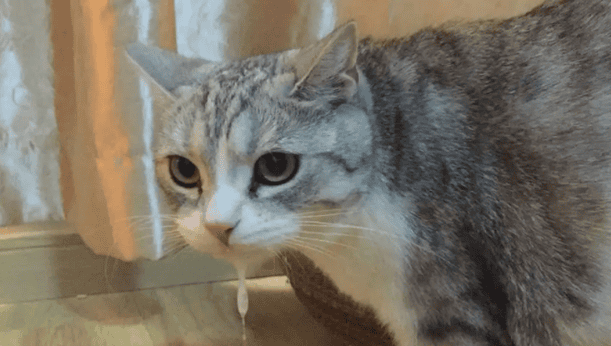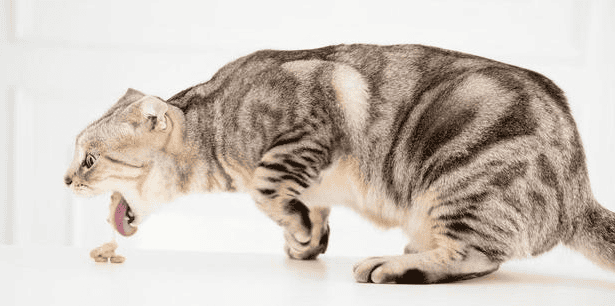Common causes of vomiting in cats
1. Hairballs
When cats comb themselves, they will swallow some loose hairs on their fur. Typically, cats will vomit hairballs. In some cases, however, it remains in the stomach for a long time and hardens into a dense mass. This can irritate the stomach and even block the digestive tract, endangering the cat’s life. Long-haired cats are at greater risk for these conditions.
2. Unscientific feeding
Feeding cats irregularly or excessively will cause gastrointestinal discomfort in cats. Cats that have not eaten for a long time will also interact with us. Also, excessive gastric acid secretion may cause vomiting on an empty stomach. Or wolfing down every meal or eating too quickly is also a common cause of vomiting in cats.

3. Vigorous exercise after meals
If the cat jumps up and down after meals and exercises vigorously, This is also a common cause of vomiting in cats.
4. Foreign objects
Don’t forget the paper clips, nails, small toys, cotton balls and other small objects lying on the floor! If these little things are accidentally eaten by cats, they are very likely to block or scratch their esophagus, causing vomiting in mild cases and life-threatening in severe cases! If you have any suspected cases, you must seek medical treatment as soon as possible
If these causes are ruled out, you need to consider gastroenteritis caused by improper diet, or vomiting caused by viral infection.
What are the preventive measures?
1. Use an appropriate amount of hair removal cream on the cat and comb it more often to make the loose hair fall off and prevent it from swallowing a large amount of hair due to licking. In addition, pay attention to replacing items that cats often come into contact with, such as toys and nest mats that shed easily.
2. Pay attention to the cleanliness of the breeding environment, clean cat bowls and bowls frequently, sweep the floors at home, and clean up kitchen waste in a timely manner to prevent cats from taking advantage of the opportunity to eat by mistake.
3. Try not to feed us human food, and let cats eat cat food and snacks specially designed for cats. If your cat's diarrhea and vomiting is caused by changing food, you need to purchase cat-specific probiotics, which can effectively restore the normal flora in the gastrointestinal tract and improve digestion and absorption.

4. Try to avoid stress. If it is determined that the cat has been frightened or stimulated recently, you need to take appropriate measures according to the cat's condition. Use the character to comfort the cat, gently stroke and hug it, or let the cat relax alone, or entertain the cat with its favorite toys.
5. Let the cat eat small meals frequently, shorten the feeding time, use a slow food bowl, reduce the speed of food intake, and prevent the cat from exercising violently after meals.
6. Use the "seven-day food exchange method" when changing food, and do not change food violently.
7. Deworm and vaccinate cats regularly to prevent cats from being infected with feline distemper.
8. Observe the cat’s condition after vomiting. If the kitten is still active and eats normally, it should be vomiting and diarrhea caused by indigestion, hairball disease or discomfort caused by changing food. If the cat's mental state is not good after vomiting, it may be diarrhea and vomiting caused by intestinal parasites, eating toxic foreign bodies, infection with viruses, etc. At this time, you need to go to the pet hospital for examination and symptomatic treatment.
9. If your cat is found to have vomiting or diarrhea, you can take photos or videos of each vomit and feces of the cat; record the time of each vomiting or diarrhea and whether there are other symptoms of the disease, so as to facilitate medical treatment. Provided to doctors.

 扫一扫微信交流
扫一扫微信交流
发布评论